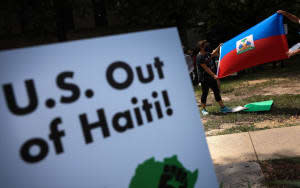Former U.S. ambassador argues American intervention in Haiti might be necessary

The Biden administration has two "basic options" when it comes to responding to the brewing crisis in Haiti following President Jovenel Moïse's assassination, James Foley, who served as U.S. ambassador to Haiti from 2003 to 2005, writes for The Atlantic.
The first is to lead a "major international intervention ... to provide the long-term security and assistance it needs to build a modern state and tackle its many difficulties." The second option is to "step back and enable Haitians to determine a way forward for their country." That appears to be the preference for many Haitians, and the Biden administration is more likely to embrace a "hands-off strategy," Foley notes.
But the White House "would be prudent to quietly accelerate planning for another contingency," Foley argues, adding that if the Haitian political and economic crises worsen, "deploying American forces temporarily may become necessary to arrest the slide into anarchy." Ultimately, the way Foley views it, "Washington must be prepared to act quickly and unilaterally in the event of a complete collapse of what remains of Haitian state authority," especially because he envisions such a scenario leading to large numbers of Haitians seeking refuge in the U.S., which would increase the pressure on the Biden administration to do something. Read Foley's full piece at The Atlantic.
You may also like
Haitian president reportedly spent 10 minutes frantically calling for help before assassination
Jan. 6 defendant sentenced to 8 months after hearing that could set benchmark for similar cases
Fox News host Tucker Carlson seems scandalized reporters are investigating his NSA spying claims
